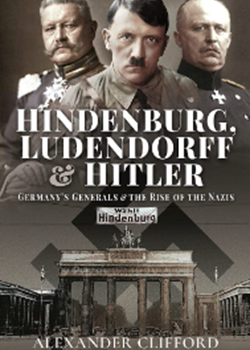Hindenburg, Ludendorff and Hitler: Germany’s Generals & the Rise of the Nazis by Alexander Clifford
- Home
- World War I Book Reviews
- Hindenburg, Ludendorff and Hitler: Germany’s Generals & the Rise of the Nazis by Alexander Clifford

(Pen & Sword, 2021) £25.00, 368 pages, notes, sources, b/w photos and index. ISBN 978–1526–78333–2 Buy a copy here > https://bit.ly/3Q6K7bE
Marshal Ferdinand Foch generalissimo of the Allied armies in the final year of the Great War, reportedly condemned the terms of the subsequent Versailles settlement as ‘Not a peace treaty, but an armistice for twenty years’. Whether he used those exact words is disputed, but there is no doubt of his conviction that without punitive sanctions and ongoing supervision, German militarism would once again lead to war in Europe. As we know, Foch was correct.
But who was responsible? As we also know it was all the fault of that jumped–up Austrian corporal Adolf Hitler, together with a craven German military elite which used him to achieve their own ends. So far, so what? Quite a lot, actually, as Alexander Clifford reveals in this excellent book. Paul von Hindenburg, as German head of state when Hitler came to power, is too often seen as a doddery and hapless dupe of the Nazis, a ‘good German’, in the author’s term. His Great War confederate Erich Ludendorff rarely has more than a walk–on part in most inter–war narratives. In fact, Hindenburg and to a lesser extent Ludendorff were the midwives and great enablers of the Nazi regime and all which followed. At various times one or the other were up to their elbows in dissenting plots against the terms of the Versailles Treaty and any form of democratic government in Germany. Little surprise then that the Weimar Republic was unstable, bankrupt and chaotic.
Rather than shuffling off into obscurity in November 1918 both men, with the unhinged Ludendorff in the lead, created and cultivated the Dolchtosslegende, the ‘Stab–in–the–Back Myth’: instead of being beaten on the battlefield, the German army had been defeated by those at home – shady politicians, leftists, greedy financiers and Jews. ‘Don’t blame me’, said Hindenburg, ‘we were betrayed by the slackers at home’. This manifest lie was eagerly grasped by Germans embarrassed by defeat, humiliated by the Versailles Treaty and fearful of Bolshevik insurrection. The political backdrop is complex, with more party acronyms than a bag of Scrabble tiles, yet Clifford is an adept guide – and helpfully provides both an annotated list of these and a dramatis personae. As early as 1919 Ludendorff was already encouraging and plotting with far right and military (often one and the same) figures to undermine the peace process while at the same time trying to exculpate his own (and Hindenburg’s) share of responsibility for Germany’s defeat. The latter sat on the sidelines, a brooding presence awaiting a second chance to dominate his country’s government – one which eventually came.
What has all this got to do with the Great War? In the study of history, as with so much else, context is everything. As Foch recognised, the First World War did not end on 11 November 1918, it shattered the old Europe, redrew its borders and created tensions and animosities which directly led to the Second. Any scholar of the war on Western Front will find this work an invaluable guide to what came next – and why.
Review by John Spencer
(This review first appeared in the April 2022 edition of Stand To! (No.126) The journal of The Western Front Association which is published four times a year and is sent to members in print and digital forms.)





